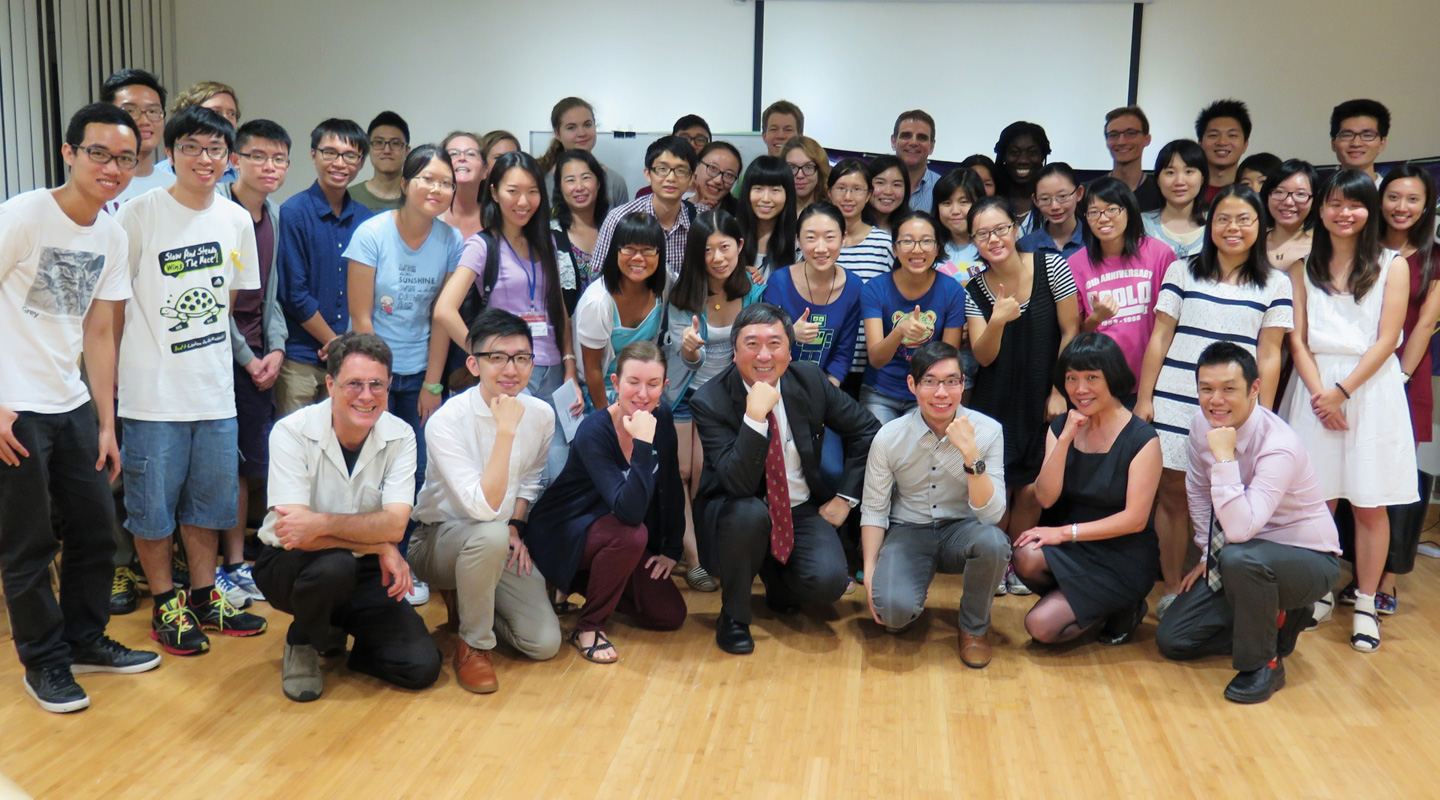Lingua Franca Acquisition Made Friendly and Easy
Director of the English Language Teaching Unit Jose Lai breaks the mould to motivate students from different disciplines to do well in English.

Despite its lingua franca status, English is regarded by many students as an academic subject rather than an essential skill. Students who think otherwise may enjoy a better chance of success in life. How to motivate a vast student body of diverse backgrounds and abilities to do well in English is a daunting task, which at CUHK falls on the English Language Teaching Unit (ELTU).
Dr. Jose Lai, Director of ELTU, said, ‘For many job openings, good English is a prerequisite. Some bankers lament the difficulty of recruiting locally because of students’ falling English standards. Multinationals look for graduates with a high command of English. Engineers told me technical knowledge alone does not get you very far on the career path, but good communication skills do. Students who set their eyes on civil service jobs have to fulfill the basic requirements in English. In the academic world, for most disciplines, the medium of publication is English. The English language is a key that opens many doors; without English, your choices are limited.’
Old Subject, New Medium
The Facebook page of ELTU, constantly updated with pieces written in savoury English, boasts a total of over 1,400 ‘likes’ and attracts around 1,000 viewers per day. The page displays links to other English learning resources available on and off campus, serving as a portal for inquisitive students to navigate the world of English at their own pace. The popularity of the ELTU Facebook page is the first step in reaching out to the digital savvy generation, and serves as a touchstone for the soft approach of bringing English to the students. On top of it, ELTU has also developed a series of online self-learning tools, such as iVocab, ILOLLS and the Impromptu Speaking Platform.
When asked where she got all these new ideas, Dr. Lai said, ‘I think they came from my conviction that students should be given the most pertinent support, which is only achievable by having different learning alternatives.’

Peer Pleasure
It takes more than serendipity to arrive at the alternatives that work. It usually starts with an idea which had no tie with reality whatsoever and was sliding in and of out of one’s mind, until one day with the right people and the right conditions around it suddenly turned into a feasible proposal that would affect how thousands of students learn. The Peer Tutoring scheme is an example of such a process.
‘I’ve always been actively involved with service learning and Peer Tutoring is actually a form of service learning. One day, I broached the subject with my colleagues and we decided to give it a go.’
Their plan was to recruit foreign students and students with high proficiency in English to help fellow students who need extra personalized support in the language in a relaxed ambience. At first, Dr. Lai and her team were concerned about whether or not they could recruit enough peer tutors, but the response proved to be much better than expected. Peer tutors are recruited through ELTU’s Facebook page and on the recommendation of the Faculty Deans and the Office of Academic Links. The Office of Student Affairs provides the venues for the tutorings. The success of the scheme underlines the importance of collaboration across the University.
To qualify for a peer tutor is not easy. Peer tutors receive training in language use and pedagogical skills, and are expected to conduct either one-on-one or small-group sessions on English speaking and writing. There are now over 100 peer tutees.

Putting it to Work
Dr. Lai also expects a lot from the new project ‘English Across the Curriculum’ (EAC). The objective of EAC is to help students apply what they learn in ELTU courses to their own disciplines. EAC is still in its infancy but has already met with much enthusiasm, showing that University members understand how much putting a language in context would do to ensure its mastery.
A lot of good has come from ELTU’s collaborations with the academic departments. It has helped students from the Faculty of Business Administration to take part in case competitions by videotaping their presentations and analyzing their use of language. One student got an award, but what Dr. Lai finds most heart-warming are thank-you letters from the students. The ELTU team has also worked with the Earth System Science Programme. The team members attended the lectures with the students, reviewed the students’ capstone projects, and selected some journal articles for analyzing the characteristics of language used therein. In addition, ELTU has also helped the Statistics Department by training their students to draft assessment reports intended for a lay readership. To that end, they prepared for the students’ reference simulated assessment reports and detailed guidelines. Other departments which have collaborated with ELTU include the Faculty of Engineering, the Faculty of Law , the School of Architecture and the Department of Social Work. The positive feedback from the collaborating departments assures Dr. Lai and her team that they are off to a good start.
‘We are at present crossing the river by groping for the pebbles, as it were, and we don’t have a fixed model yet. That said, we are hopeful because we know this is the way forward,’ she said.
The pebbles may be slippery, but the amount of support shown to ELTU is truly encouraging. ‘I feel indebted to my colleagues, the senior management, and everyone involved; I must thank them for their trust.’
The writer was reminded of a quote in E.M. Forster’s Howards End: ‘Only Connect!’ Teachers who go the extra mile to show students the relevance of knowledge to their lives do not simply teach; they facilitate their students to make meaningful connections in life.
A Student’s Account: what motivates me to learn English

Isaac Li, a final year law student, tells us what motivates him to learn English. Isaac was the second runner-up of the ‘21st Century Coca-Cola Cup’ National English Speaking Competition held by the China Daily. He also won two additional prizes at the competition: the Most Talented Speaker of the Test of English for International Communication and winner of the Australia Plus Best Innovation Award. The contest was attended by over 12,800 students from 838 schools across China.
‘To be able to compete with the cream of the crop from China was an excellent opportunity to sharpen my public speaking skills,’ he said. He was trained by Ms. Ella Leung, senior lecturer of ELTU.
‘Public speaking is very different from the “English speaking” we know. We need to improvise and be confident at all times. Ella taught me how to use rhetorical devices and organize my ideas in a short period of time. The toughest part of the contest was making a three-minute speech within 20 minutes. The skills and mental preparation with which Ella equipped me were really useful.’
He attributes his motivation to learn English to his liking for the culture of the West, inspired by his exposure to public speaking in his teenage years. In 2009, he contended in the 61st Hong Kong Schools Speech Festival and won the Championship for Dramatic Duologue for his role as Shmuel, a protagonist in the novel The Boy in Striped Pyjamas. This experience has opened him up to the world of English literature and broadened his horizon.
He enjoys watching the American fantasy television drama series Game of Thrones and reading the novels by Jeffrey Archer as a pastime.
If we believe that most motivated language learners have had some interesting encounters with the language, the ‘soft approach’ adopted by the Unit is going to be highly successful as it is designed to shed light on the fun aspects of English.
This article was originally published in No. 480, Newsletter in Jun 2016.

